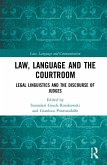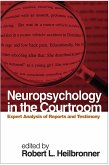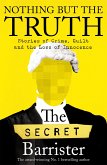Otgaar
FINDING THE TRUTH IN THE COURTROOM C
Otgaar
FINDING THE TRUTH IN THE COURTROOM C
- Gebundenes Buch
- Merkliste
- Auf die Merkliste
- Bewerten Bewerten
- Teilen
- Produkt teilen
- Produkterinnerung
- Produkterinnerung
Finding the Truth in the Courtroom combines the science behind deception and memory and their relation in court. Testimonies are oftentimes the most important piece of evidence in legal cases. Hence, this book shows how such testimonies can be riddled with deception and/or memory errors, how to detect them, and what you can against them.
Andere Kunden interessierten sich auch für
![Let the Dead Speak Let the Dead Speak]() Jane CaseyLet the Dead Speak17,99 €
Jane CaseyLet the Dead Speak17,99 €![Neurolaw in the Courtroom Neurolaw in the Courtroom]() Neurolaw in the Courtroom31,99 €
Neurolaw in the Courtroom31,99 €![From the Courtroom to the Boardroom From the Courtroom to the Boardroom]() Deena VarnerFrom the Courtroom to the Boardroom31,99 €
Deena VarnerFrom the Courtroom to the Boardroom31,99 €![Rationale of Judicial Evidence, Specially Applied to English Practice, From the Mss. of J. Bentham [Ed. by J.S. Mill] Rationale of Judicial Evidence, Specially Applied to English Practice, From the Mss. of J. Bentham [Ed. by J.S. Mill]]() Jeremy BenthamRationale of Judicial Evidence, Specially Applied to English Practice, From the Mss. of J. Bentham [Ed. by J.S. Mill]39,99 €
Jeremy BenthamRationale of Judicial Evidence, Specially Applied to English Practice, From the Mss. of J. Bentham [Ed. by J.S. Mill]39,99 €![Law, Language and the Courtroom Law, Language and the Courtroom]() Law, Language and the Courtroom167,99 €
Law, Language and the Courtroom167,99 €![Neuropsychology in the Courtroom Neuropsychology in the Courtroom]() Neuropsychology in the Courtroom65,99 €
Neuropsychology in the Courtroom65,99 €![Nothing But The Truth Nothing But The Truth]() The Secret BarristerNothing But The Truth26,99 €
The Secret BarristerNothing But The Truth26,99 €-
-
-
Finding the Truth in the Courtroom combines the science behind deception and memory and their relation in court. Testimonies are oftentimes the most important piece of evidence in legal cases. Hence, this book shows how such testimonies can be riddled with deception and/or memory errors, how to detect them, and what you can against them.
Produktdetails
- Produktdetails
- Verlag: Oxford University Press Inc
- Seitenzahl: 298
- Erscheinungstermin: 16. November 2017
- Englisch
- Abmessung: 240mm x 161mm x 21mm
- Gewicht: 550g
- ISBN-13: 9780190612016
- ISBN-10: 0190612010
- Artikelnr.: 48955813
- Herstellerkennzeichnung
- Libri GmbH
- Europaallee 1
- 36244 Bad Hersfeld
- gpsr@libri.de
- Verlag: Oxford University Press Inc
- Seitenzahl: 298
- Erscheinungstermin: 16. November 2017
- Englisch
- Abmessung: 240mm x 161mm x 21mm
- Gewicht: 550g
- ISBN-13: 9780190612016
- ISBN-10: 0190612010
- Artikelnr.: 48955813
- Herstellerkennzeichnung
- Libri GmbH
- Europaallee 1
- 36244 Bad Hersfeld
- gpsr@libri.de
Henry Otgaar works as Assistant Professor at the Forensic Psychology section, Faculty of Psychology and Neuroscience, Maastricht University. His research expertise revolves around issues such as the development of memory, false memory, the link between trauma, memory, and psychopathology, and memory in the legal area. He has published numerous peer-reviewed articles, book chapters, and books on memory (e.g., What Is Adaptive About Adaptive Memory?, OUP 2014). He has received many (inter)national awards for his research such as the Edmond Hustinx Science Award and the Early Career Excellence Award. He also works as an expert witness for the Maastricht Forensic Institute and is an associate editor for Memory and a co-editor for In-Mind. Mark L. Howe holds a Chair in Cognitive Science at City, University of London. His over 35 years of research on memory has addressed questions concerning memory development, memory illusions, the adaptive functions of memory, links between reasoning and memory, memory in traumatized and maltreated children, as well as memory and the law. He has published numerous peer-reviewed articles, book chapters, and books on memory development (e.g., The Nature of Early Memory, OUP 2011) and memory and the law (e.g., Memory and Miscarriages of Justice, 2017). In addition to editing a variety of books (e.g., Stress, Trauma, and Children's Memory Development, OUP 2008; What Is Adaptive About Adaptive Memory?, OUP 2014), he is the Associate Editor of Developmental Review and an Editor-in-Chief for Memory.
* About the Editors
* Contributors
* Chapter 1: Deception and Memory in the Courtroom: An Overview
* Henry Otgaar and Mark L. Howe
* Part I: Memory in the Courtroom
* Chapter 2: Misinformation in the Courtroom
* Shari R. Berkowitz and Elizabeth F. Loftus
* Chapter 3: Suggestibility in the Courtroom: How Memory Can Be
Distorted During the Investigative and Legal Process
* Fiona Gabbert and Lorraine Hope
* Chapter 4: When Spontaneous Statements Should Not Be Trusted: False
Memories in Children and Adults
* Henry Otgaar and Mark L. Howe
* Chapter 5: A Neurobiological Account False Memories
* Vincent van de Ven, Henry Otgaar, and Mark L. Howe
* Part II: Children in the Courtroom
* Chapter 6: Assessing the Veracity of Children's Forensic Interviews:
Implications for the Courtroom
* Hayden M. Henderson and Samantha J. Andrews
* Chapter 7: Putting Children's Memory and Suggestibility in their
Place: An Analysis Considering Person, Topic, and Context
* Deborah Goldfarb, Gail S. Goodman, Rakel P. Larson, Alejandra
Gonzalez, and Mitchell L. Eisen
* Part III: Deception in the Courtroom
* Chapter 8: Nonverbal Detection of Deception
* Aldert Vrij
* Chapter 9: Building a Case: The Role of Empirically Based
Interviewing Techniques in Case Construction
* Timothy J. Luke, Maria Hartwig, Laure Brimbal, and Pär Anders Granhag
* Chapter 10: Deception Detection Using Psychophysiological and Neural
Measures
* Ewout H. Meijer and Bruno Verschuere
* Part IV: Malingering in the Courtroom
* Chapter 11: Seven Myths About Feigning
* Marko Jelicic, Harald Merckelbach, and Irena Boskovi
* Chapter 12: False Symptom Claims and Symptom Validity Assessment
* Thomas Merten
* Index
* Contributors
* Chapter 1: Deception and Memory in the Courtroom: An Overview
* Henry Otgaar and Mark L. Howe
* Part I: Memory in the Courtroom
* Chapter 2: Misinformation in the Courtroom
* Shari R. Berkowitz and Elizabeth F. Loftus
* Chapter 3: Suggestibility in the Courtroom: How Memory Can Be
Distorted During the Investigative and Legal Process
* Fiona Gabbert and Lorraine Hope
* Chapter 4: When Spontaneous Statements Should Not Be Trusted: False
Memories in Children and Adults
* Henry Otgaar and Mark L. Howe
* Chapter 5: A Neurobiological Account False Memories
* Vincent van de Ven, Henry Otgaar, and Mark L. Howe
* Part II: Children in the Courtroom
* Chapter 6: Assessing the Veracity of Children's Forensic Interviews:
Implications for the Courtroom
* Hayden M. Henderson and Samantha J. Andrews
* Chapter 7: Putting Children's Memory and Suggestibility in their
Place: An Analysis Considering Person, Topic, and Context
* Deborah Goldfarb, Gail S. Goodman, Rakel P. Larson, Alejandra
Gonzalez, and Mitchell L. Eisen
* Part III: Deception in the Courtroom
* Chapter 8: Nonverbal Detection of Deception
* Aldert Vrij
* Chapter 9: Building a Case: The Role of Empirically Based
Interviewing Techniques in Case Construction
* Timothy J. Luke, Maria Hartwig, Laure Brimbal, and Pär Anders Granhag
* Chapter 10: Deception Detection Using Psychophysiological and Neural
Measures
* Ewout H. Meijer and Bruno Verschuere
* Part IV: Malingering in the Courtroom
* Chapter 11: Seven Myths About Feigning
* Marko Jelicic, Harald Merckelbach, and Irena Boskovi
* Chapter 12: False Symptom Claims and Symptom Validity Assessment
* Thomas Merten
* Index
* About the Editors
* Contributors
* Chapter 1: Deception and Memory in the Courtroom: An Overview
* Henry Otgaar and Mark L. Howe
* Part I: Memory in the Courtroom
* Chapter 2: Misinformation in the Courtroom
* Shari R. Berkowitz and Elizabeth F. Loftus
* Chapter 3: Suggestibility in the Courtroom: How Memory Can Be
Distorted During the Investigative and Legal Process
* Fiona Gabbert and Lorraine Hope
* Chapter 4: When Spontaneous Statements Should Not Be Trusted: False
Memories in Children and Adults
* Henry Otgaar and Mark L. Howe
* Chapter 5: A Neurobiological Account False Memories
* Vincent van de Ven, Henry Otgaar, and Mark L. Howe
* Part II: Children in the Courtroom
* Chapter 6: Assessing the Veracity of Children's Forensic Interviews:
Implications for the Courtroom
* Hayden M. Henderson and Samantha J. Andrews
* Chapter 7: Putting Children's Memory and Suggestibility in their
Place: An Analysis Considering Person, Topic, and Context
* Deborah Goldfarb, Gail S. Goodman, Rakel P. Larson, Alejandra
Gonzalez, and Mitchell L. Eisen
* Part III: Deception in the Courtroom
* Chapter 8: Nonverbal Detection of Deception
* Aldert Vrij
* Chapter 9: Building a Case: The Role of Empirically Based
Interviewing Techniques in Case Construction
* Timothy J. Luke, Maria Hartwig, Laure Brimbal, and Pär Anders Granhag
* Chapter 10: Deception Detection Using Psychophysiological and Neural
Measures
* Ewout H. Meijer and Bruno Verschuere
* Part IV: Malingering in the Courtroom
* Chapter 11: Seven Myths About Feigning
* Marko Jelicic, Harald Merckelbach, and Irena Boskovi
* Chapter 12: False Symptom Claims and Symptom Validity Assessment
* Thomas Merten
* Index
* Contributors
* Chapter 1: Deception and Memory in the Courtroom: An Overview
* Henry Otgaar and Mark L. Howe
* Part I: Memory in the Courtroom
* Chapter 2: Misinformation in the Courtroom
* Shari R. Berkowitz and Elizabeth F. Loftus
* Chapter 3: Suggestibility in the Courtroom: How Memory Can Be
Distorted During the Investigative and Legal Process
* Fiona Gabbert and Lorraine Hope
* Chapter 4: When Spontaneous Statements Should Not Be Trusted: False
Memories in Children and Adults
* Henry Otgaar and Mark L. Howe
* Chapter 5: A Neurobiological Account False Memories
* Vincent van de Ven, Henry Otgaar, and Mark L. Howe
* Part II: Children in the Courtroom
* Chapter 6: Assessing the Veracity of Children's Forensic Interviews:
Implications for the Courtroom
* Hayden M. Henderson and Samantha J. Andrews
* Chapter 7: Putting Children's Memory and Suggestibility in their
Place: An Analysis Considering Person, Topic, and Context
* Deborah Goldfarb, Gail S. Goodman, Rakel P. Larson, Alejandra
Gonzalez, and Mitchell L. Eisen
* Part III: Deception in the Courtroom
* Chapter 8: Nonverbal Detection of Deception
* Aldert Vrij
* Chapter 9: Building a Case: The Role of Empirically Based
Interviewing Techniques in Case Construction
* Timothy J. Luke, Maria Hartwig, Laure Brimbal, and Pär Anders Granhag
* Chapter 10: Deception Detection Using Psychophysiological and Neural
Measures
* Ewout H. Meijer and Bruno Verschuere
* Part IV: Malingering in the Courtroom
* Chapter 11: Seven Myths About Feigning
* Marko Jelicic, Harald Merckelbach, and Irena Boskovi
* Chapter 12: False Symptom Claims and Symptom Validity Assessment
* Thomas Merten
* Index


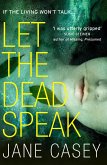

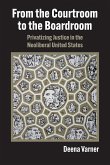
![Rationale of Judicial Evidence, Specially Applied to English Practice, From the Mss. of J. Bentham [Ed. by J.S. Mill] Rationale of Judicial Evidence, Specially Applied to English Practice, From the Mss. of J. Bentham [Ed. by J.S. Mill]](https://bilder.buecher.de/produkte/68/68590/68590746m.jpg)
